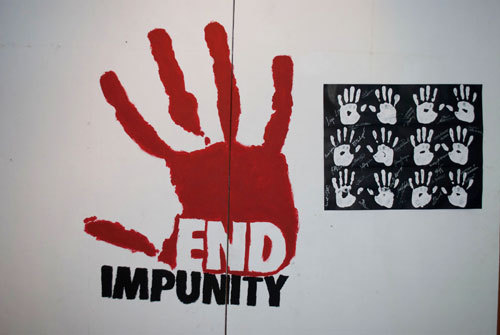Grief-stricken Reshma came to the Supreme Court in Karachi last month carrying a poster-sized photograph of his slain husband Munir Ahmed Sangi, lying in a pool of blood. She is trying to seek justice in her spouse’s murder case for the last eight years. A lower court in Larkana district in Sindh province is hearing the case. In a fit of anger, she burnt the case file, comprising 150 pages in front of dozens of news channel cameras.
Sangi worked as a cameraman for a popular Sindhi language news channel KTN (Kawaish Television Network). He was killed while covering a clash between the two tribes on May 29, 2006. One bullet hit him while another damaged his camera. The dead body and damaged camera could be seen in a photograph published in newspapers the next day.
The widow was in tears as she spoke to Mazhar Abbas, Freedom Network’s regular blogger and former secretary-general of Pakistan Federal Union of Journalists, giving details about the progress in her case. She handed him a second copy of the file. “I am under threat and staying with my relatives in Karachi, because I refuse to withdraw the case against Altaf Unar (a former provincial minister and now member of the Sindh Assembly representing Pakistan People’s Party),” she claims.
Sangi’s brother Hadi Sangi got his brother’s job as a cameraman for KTN. He is also facing court cases and threats. “Larkana has become a ‘no-go area’ for us,” she explained, flanked by her brother-in-law and a few other relatives.
“I just want justice in the case of my slain husband. If they can’t give justice, please give me one bullet to kill myself,” Reshma said in desperation.
Eight accused, including Unar, were nominated in the murder case of journalist Munir Sangi. Three of them named as directly charged while five were nominated as accused for their indirect involvement. This in itself is quite unusual. Unar, who was the minister but was not with the Pakistan People’s Party, at the time of the murder, was put in the second category. Initially, all accused were arrested but later court granted them bails.
Mr Unar denies the charges.
The main accused are Mulan Madad, Abdul Karim, Irfan Baluch, Altaf Unar (head of Unar tribe), Dr. Akhtar Allah Dayo, Muhammad Yusuf, Allah Jurio, Safdar Ali Abbasi and Muhammad Ayaz Khero.
After countrywide protests, a judicial inquiry was ordered by the then Sindh chief minister. The file also contained findings of the inquiry. It included remarks such as “journalists in Upper Sindhi are killed when they report irregularities or tribal feuds.”
The inquiry also found out that “Mr Solangi got a telephone call that two armed men from the Unar and Abro tribes were firing at each other. He took a private car and reached the Bagapur village to cover the event. One of the accused allegedly asked his son, also involved in the firing, to kill the cameraman. The son obediently pointed the gun at Munir Sangi and killed him.”
Later, Mr Unar joined the PPP of former prime minister late Benazir Bhutto in what appears to be an attempt to save himself from the arrest. He avoided appearing in the court on medical grounds. However, record shows that he regularly appeared in the Sindh Assembly sessions but not in the sessions court.
The file also reveals a report submitted by the then home secretary, which confirms that Munir Sangi was targeted by one of the accused for recording visuals of the clash.
In 2009, Reshma and Hadi filed a petition in the Supreme Court, pleading that their lives are in danger. The court appointed a committee to probe the allegations. The then Police DIG, Sanaullah Abbasi, asked for some more time for investigations.
When asked about the status of the case, she responded. “No one is appearing, no statement has been recorded. I don’t know where to go. My life has already been destroyed but now they are after my and Munir Sangi’s family. They want me to surrender and withdraw the case. I will not.”
“I wanted to burn myself with the case file but Mr Hadi and other cameramen stopped me.”
Reshma reminded me of the widow of another journalist Hayatullah Khan from the tribal region of North Waziristan. Hayatullah was kidnapped in December 2005 and five months later his dead body was found. His wife was as courageous as Reshma, recorded her testimony before a one-man commission of Peshawar High Court and identified the suspects. A month later, she died in a mysterious explosion.
She will get justice or go down fighting the impunity of crimes against media in Pakistan?
Image: Courtesy Google Images
A Widow's Fight Against Impunity
- November 23, 2013
- 2:04 am
- No Comments
More from the News section
July 26, 2023
No Comments
June 20, 2023
2 Comments
March 21, 2023
No Comments
August 30, 2022
No Comments
August 30, 2022
No Comments

Resize text-+=
